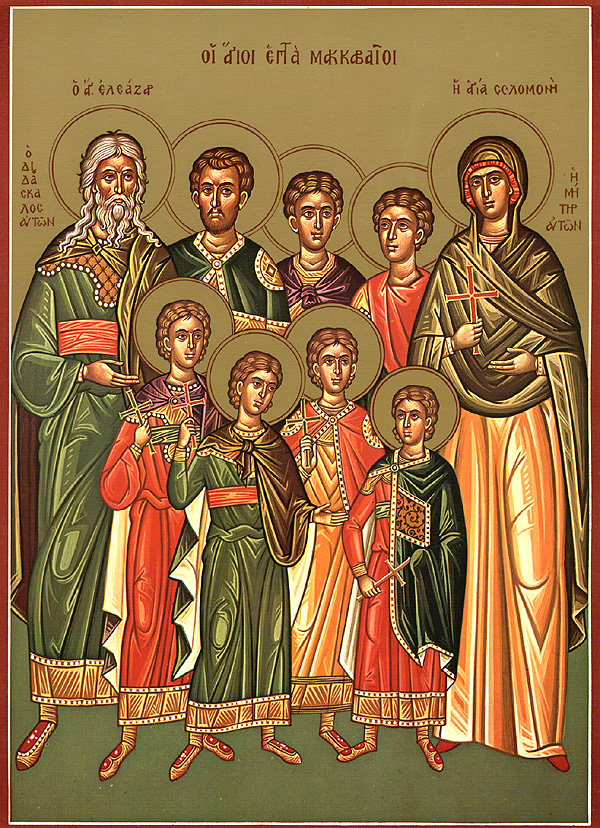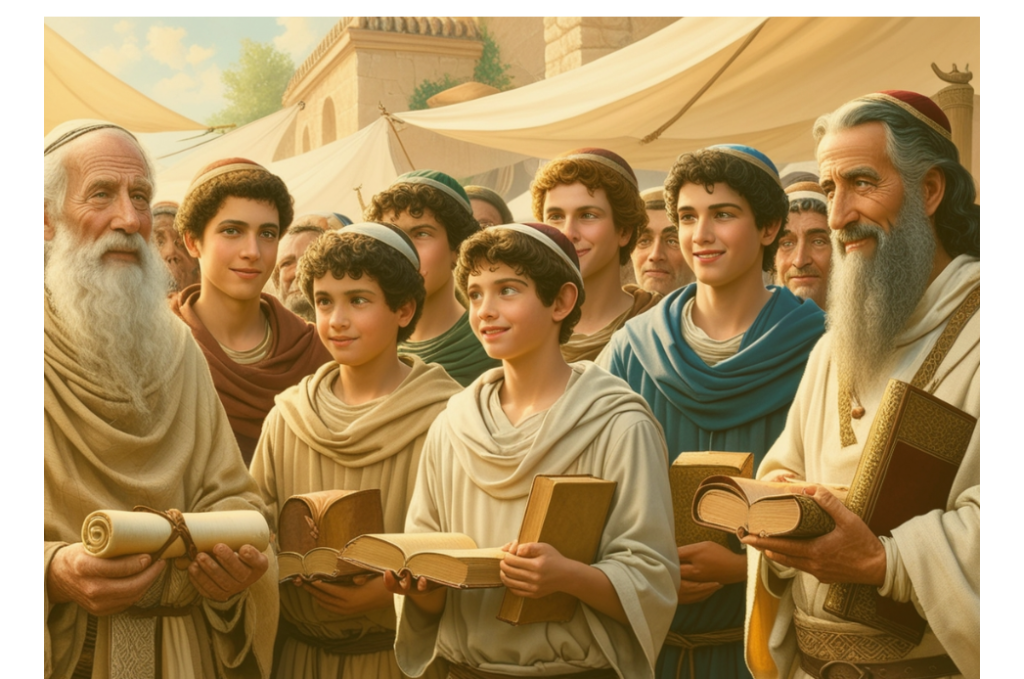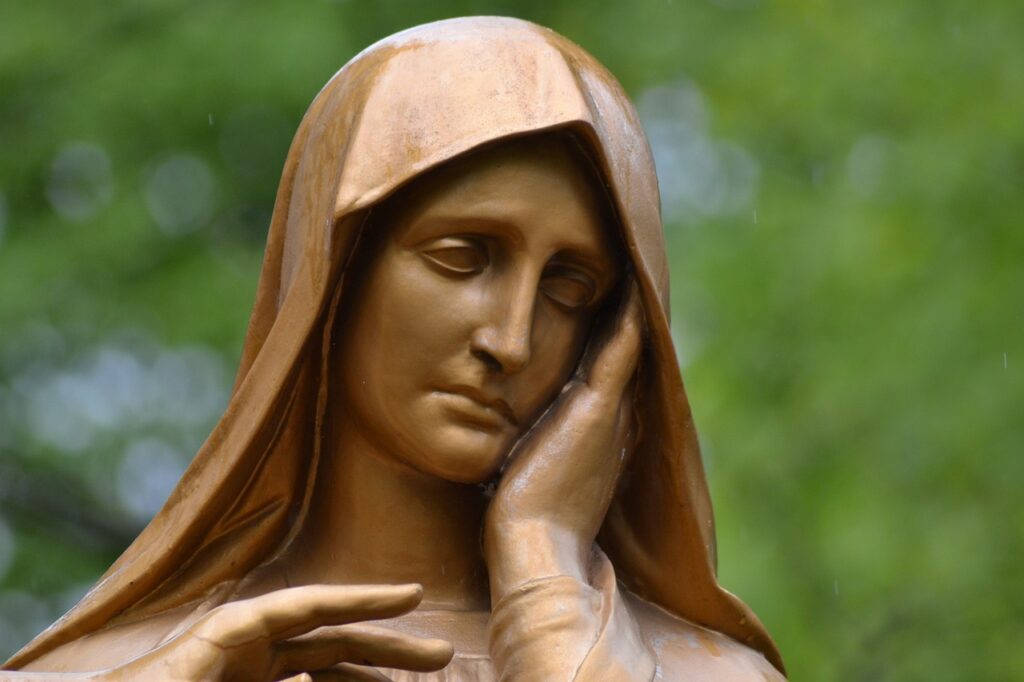Eleazar (on the left from 2 Maccabees 6:18-31), The Seven Maccabean Brothers (center), and Salome, their mother (on the right)
Introduction
Many Protestant apologists claim that the Bible is historically agreed upon by all Jews, self-interpreting, and only quotes what it considers Scripture. This belief shows the idea that the Bible exists in a divinely preserved state, with an agreed-upon collection of books making up all that is necessary for the matters of the Christian faith. With this idea in mind, a common argument among Protestants is that the Bible never quotes the Apocrypha. (what Catholics call the Deuterocanon). [1]
But is this claim accurate?
Does The Bible Quote The “Apocrypha”?
In a separate analysis, I have compiled a comprehensive list of explicit biblical citations and allusions to the Deuterocanonical books.
You can access a detailed examination here: Hidden Plain Sight: How Jesus and the Bible Quote the Deuterocanonical Books
While some Protestant scholars attempt to reinterpret or dismiss these references through alternative explanations, a wholesale rejection of their significance disregards both scholarly consensus and historical evidence—particularly concerning the influence of Maccabean literature on early Christian thought.
How Does Hebrews Reference The Maccabees?
The Epistle to the Hebrews, particularly Hebrews 11:35, presents a compelling allusion to the martyrdom account in 2 Maccabees 7.
Hebrews 11:35 states:
” 35 Women received their dead back through resurrection. Others who were tortured refused to accept release in order to obtain a better resurrection.”
The first part of the verse refers to Old Testament resurrections, such as Elijah raising the widow’s son (1 Kings 17:17-24) or Elisha raising the Shunammite’s son
(2 Kings 4:32-37).
However, The second part (“Others who were tortured refused to accept release”) has no parallel in the Protestant Old Testament but directly aligns with 2 Maccabees 7.
The Maccabean martyrdom narrative recounts the suffering of seven Jewish brothers and their mother, who were tortured and executed under Antiochus IV Epiphanes for refusing to violate Jewish law. Several key passages illustrate their steadfast faith and belief in divine resurrection:
“It happened also that seven brothers and their mother were arrested and were being compelled by the king, under torture with whips and thongs, to partake of unlawful swine’s flesh.” (2 Macc. 7:1)
“And when he was at his last breath, he said: ‘You accursed wretch, you dismiss us from this present life, but the King of the universe will raise us up to an everlasting renewal of life, because we have died for his laws.’” (2 Macc. 7:9)
“One of the brothers, about to die, said: ‘It is good to die at the hands of men and to cherish the hope that God gives of being raised again by him.’” (2 Macc. 7:14)
The parallel between Hebrews and 2 Maccabees is striking. Hebrews 11:35 describes believers who endured torture rather than seek release, hoping for a better resurrection. This concept is explicitly present in 2 Maccabees 7, where the martyrs profess their hope in resurrection and divine justice, even in the face of death. The Maccabean martyrs reject the king’s command to eat unlawful food, choosing death over disobedience, while Hebrews commends those who suffer for their faith, echoing the same steadfast devotion seen in 2 Maccabees 7.
What Does This Mean?
This suggests that the author of Hebrews was familiar with and drew from Deuterocanonical sources, even though they are not included in the Protestant Old
Testament. It also suggests again that there was no universal Canon during the first century. For Further research on this, see my previous post.
The Canon Question: Jews During the Time of Christ and Their Diverse Views on Scripture
No Protestant Canon Connection
The Protestant Old Testament lacks any direct parallel to Hebrews 11:35’s description of faithful endurance through torture. Some apologists will resort to explaining how the martyrs are either unmentioned Jewish martyrs from the Old Testament (despite the clear parallel to the Macabees) or they will explain them away as early Christian martyrs not mentioned in the New Testament.
However these are simply arguments from silence as the protestant Bible again, has no matching event. I would directly challenge anyone to find a parallel in the Protestant bible that matches the description of those tortured in Hebrews 11.
What Is The Scholarly Opinion on Hebrews 11:35?
In order to further cement the claim that Hebrews 11:35 is a direct reference to the Maccabees I have attached below some common conclusions posed by academics regarding this subject. I have also attached a link to 50 Protestant Commentaries on Hebrews 11:35. Note: I did not compile this list and all credit is due to the author of this gracious list! This list is the nail in the coffin for any objectors to the claim.
The sufferings of v35b-38 are principally those endured by faithful Israelites in the persecution that preceded and accompanied the Maccabean Revolt (cf 1 Масс 1:60-63; 7:34; 2 Масс 6:18-31;7:1-42) [2].
“… Compared to 1 Maccabees “there is much evidence for Christian interest” in 2 Maccabees. This is mainly due to the text’s accounts about the violent death of several Jewish righteous like Eleazar (2 Maccabees 6:18–31) and the seven sons and their mother (2 Maccabees 7). Although we do not have explicit citations of 2 Maccabees in the New Testament, the evidence for the book’s use is quite clear. Gerbern Oegema, again, sees the use of key terms like (“way of life”) and (“Judaism”) in Galatians 1:13–14 as possibly influenced by concepts used in 2 Maccabees. The first quite clear allusions may be seen among the examples of belief in Israel’s history put together in Hebrews 11. It is mainly Hebrews 11:35–36 and 38 with both its descriptions of “women who received their dead by resurrection” (verse 35: possibly 2 Maccabees 7:29) and its overview of different tortures (verses 35b–36: possibly 2 Maccabees 6:19, 28; 7:7) plus, finally, the idea that some had to withdraw “to deserts, mountains, and caves” (verse 38: 2 Maccabees 10:6), where these possible allusions can be found …” [3].
Does this prove the author of Hebrews considered the Maccabees to be divinley inspired?
Not necessarily. While many Protestants argue that a biblical citation supports a book’s inclusion in the canon, numerous works referenced in Scripture are not considered canonical. If one were to maintain that mere citation is sufficient evidence for a book’s divine inspiration, then consistency would require questioning the status of several books in the Protestant Old Testament that are never quoted anywhere else in Scripture. Those are the books of Esther, Song of Songs, Obadiah, Nahum, Zephaniah,and Ecclesiastes.
As one genuine Lutheran blogger points out, “It seems highly probable the writer to the Hebrews alluded to the Apocrypha in chapter 11. The parallels Catholic apologists suggest particularly in verse 35 and 2 Maccabees seem likely. “Others were tortured,” “not accepting their release” and “so that they might obtain a better resurrection” appear to be the closest points of contact with 2 Maccabees.” [4].
So What Is The Conclusion?
Hebrews 11:35 strongly parallels 2 Maccabees 7, reinforcing that the author of Hebrews was not only aware of Deuterocanonical literature but also drew from it as a source of theological and historical significance. This challenges the claim that the Deuterocanonical books were dismissed or irrelevant to early Christian thought. Rather, their inclusion in the theological framework of Hebrews suggests that they were valued and respected by early Christian communities.
Footnotes
Deuterocanonical Books. https://en.wikipedia.org/wiki/Deuterocanonical_books.
Bourke, Myles M. Commentary on Hebrews. In New Jerome Biblical Commentary, edited by Raymond Brown, Joseph Fitzmeyer, and Ronald Murphy, p. 940. 1990. https://libsearch.stkate.edu/discovery/fulldisplay?context=L&vid=01CLIC_SCU:STKATE&tab=CLIC_and_SCU_ALL&docid=alma991001695539703689.
Nicklas, Tobias. The Apocrypha in the History of Early Christianity. In The Oxford Handbook of the Apocrypha, edited by Gerbern S. Oegema, 52-73. Oxford University Press, 2021. https://academic.oup.com/edited-volume/33426#login-purchase.
Beggars All: Reformation and Apologetics. Is Hebrews 11:35-37 Proof for the Inclusion of the Apocrypha in the Canon? November 16, 2008. https://beggarsallreformation.blogspot.com/2008/11/is-hebrews-1135-37-proof-for-inclusion.html?m=1.



